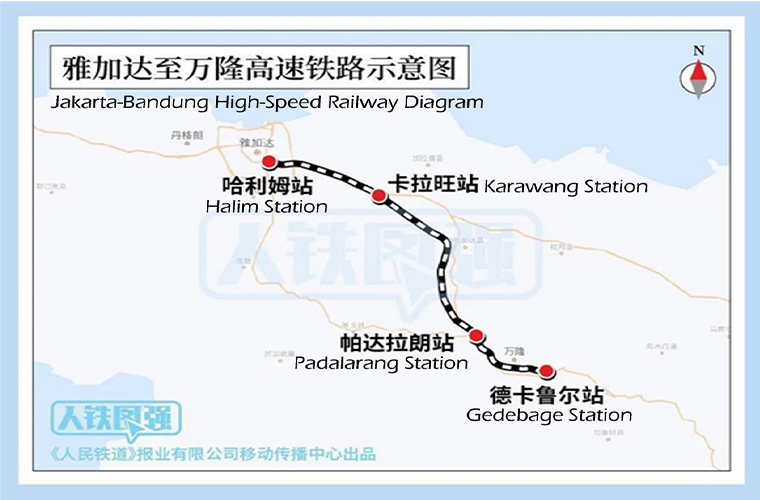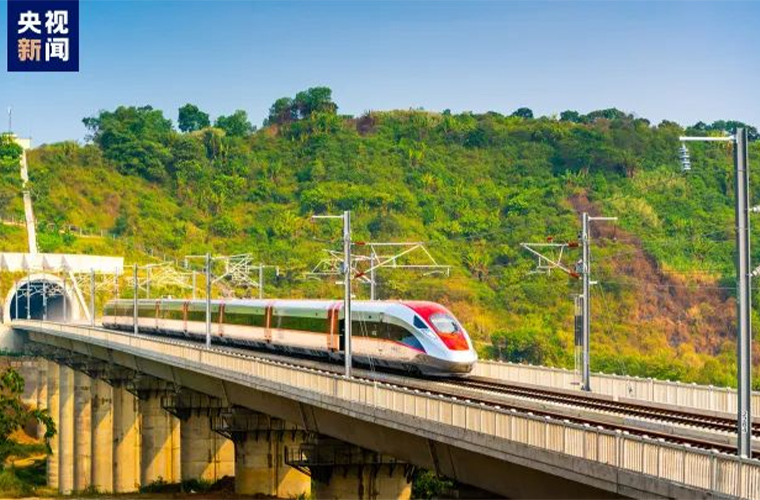


On September 7, 2023, the Jakarta-Bandung high-speed railway, a collaborative effort between China and Indonesia, commenced its operations, reducing the travel time between the two cities from 3.5 hours to just 40 minutes. In early October 2023, commercial ticket sales will officially begin, which marks Indonesia's entry into the era of high-speed rail and a significant milestone in the joint "Belt and Road" initiative between China and Indonesia.
The Jakarto-Bandung high-speed railway is the first high-speed railway in Indonesia and Southeast Asia. It serves as a flagship project for the collaboration between China and Indonesia within the framework of the "Belt and Road" initiative and Indonesia's "Global Maritime Fulcrum" vision. The entire railway line is built using Chinese technology and adheres to Chinese standards.
The Jakarta-Bandung high-speed railway connects the Indonesian capital, Jakarta, with the renowned tourist city of Bandung. The total length of the railway is 142.3 kilometers, with a maximum operating speed of 350 kilometers per hour. The route starts in Jakarta and passes through Bekasi City, Bekasi County, Karawang County, Purwakarta County, West Bandung County, Cimahi City, and Bandung County, ultimately reaching Bandung City. Along the route, there are four stations: Halim, Karawang, Padalarang, and Gedebage.

Jakarta-Bandung High-Speed Railway Diagram. [Photo/China Railway Official WeChat Account]
During the construction of the Jakarta-Bandung high-speed railway, a significant amount of locally produced materials, such as cement, were purchased, which stimulated the local economy. The project also involved a substantial recruitment of Indonesian workers to participate in the construction efforts, resulting in a cumulative employment of 51,000 individuals from the local community. Additionally, approximately 45,000 Indonesian workers received training as part of the project, contributing to skill development and capacity building within the country.
The geological and environmental conditions along the Jakarta-Bandung high-speed railway route were complex, presenting significant challenges for construction. Collaborating units from China and Indonesia drew upon China's successful experience in high-speed railway construction, adhering to ecological and environmental principles. They placed a strong emphasis on survey and design, construction organization, safety, and quality control, ensuring the project proceeded in a scientific, orderly, high-quality, and efficient manner.
To address the challenging geological conditions, the project team carefully selected the route to avoid areas prone to landslides, volcanoes, and other adverse geological factors. They also implemented innovative designs, including bridges with better seismic performance, ballastless track with higher smoothness, and more advanced train operation control systems. The project was built to high standards, resulting in the construction of 13 tunnels and 56 bridges.
Before the Jakarta-Bandung high-speed railway commenced its operations, both China and Indonesia diligently organized various units to conduct integrated testing, inspection, and safety assessments of all professional equipment. They carried out comprehensive optimizations and adjustments for aspects such as track conditions, overhead wire performance, train control, and communication signal systems. These efforts were aimed at ensuring that the railway met all the necessary conditions for safe and efficient operation.
Furthermore, careful selection and training were undertaken for operational management and equipment maintenance personnel. Strict training and examinations were conducted to confirm that they possessed the qualifications required for their roles. This rigorous preparation and assessment process aimed to ensure the smooth and safe operation of the high-speed railway upon its opening.

High-speed trainsets are speeding along the Jakarta-Bandung high-speed railway track. [Photo/CCTV News]
With the opening of the Jakarta-Bandung high-speed railway, the travel time between Jakarta and Bandung will be significantly reduced, leading to a substantial improvement in local transportation conditions. This will provide greater convenience for the residents along the railway route, stimulate commercial development, and promote the growth of the tourism industry. It will inject momentum into regional economic and social development, offering new opportunities and benefits.
Moreover, the high-speed railway project holds immense significance for deepening practical cooperation between China and Indonesia and building a shared future for both nations. It contributes to the strengthening of ties and cooperation between the two countries and plays a pivotal role in fostering a sense of community between China and Indonesia.
Riding on the "Belt and Road" initiative's momentum, the Jakarta-Bandung high-speed railway, speeding along its tracks, will transform Indonesia's development vision into reality. It will inject acceleration and provide new energy for regional economic and social development.
Source: <http://www.nbd.com.cn/articles/2023-09-07/3009730.html>
<https://cnapp.chinadaily.com.cn/a/202309/07/AP64f9675ba310588ba24d1bc7.html>
Edited and translated by Lu Yufei